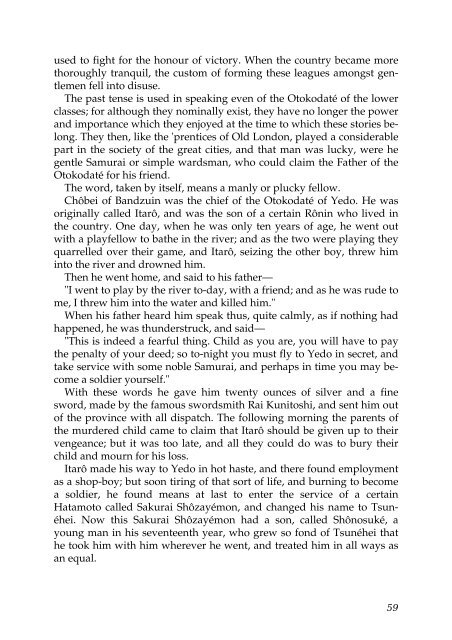You also want an ePaper? Increase the reach of your titles
YUMPU automatically turns print PDFs into web optimized ePapers that Google loves.
used to fight for the honour <strong>of</strong> victory. When the country became more<br />
thoroughly tranquil, the custom <strong>of</strong> forming these leagues amongst gentlemen<br />
fell into disuse.<br />
The past tense is used in speaking even <strong>of</strong> the Otokodaté <strong>of</strong> the lower<br />
classes; for although they nominally exist, they have no longer the power<br />
and importance which they enjoyed at the time to which these stories belong.<br />
They then, like the 'prentices <strong>of</strong> <strong>Old</strong> London, played a considerable<br />
part in the society <strong>of</strong> the great cities, and that man was lucky, were he<br />
gentle Samurai or simple wardsman, who could claim the Father <strong>of</strong> the<br />
Otokodaté for his friend.<br />
The word, taken by itself, means a manly or plucky fellow.<br />
Chôbei <strong>of</strong> Bandzuin was the chief <strong>of</strong> the Otokodaté <strong>of</strong> Yedo. He was<br />
originally called <strong>It</strong>arô, and was the son <strong>of</strong> a certain Rônin who lived in<br />
the country. One day, when he was only ten years <strong>of</strong> age, he went out<br />
with a playfellow to bathe in the river; and as the two were playing they<br />
quarrelled over their game, and <strong>It</strong>arô, seizing the other boy, threw him<br />
into the river and drowned him.<br />
Then he went home, and said to his father—<br />
"I went to play by the river to-day, with a friend; and as he was rude to<br />
me, I threw him into the water and killed him."<br />
When his father heard him speak thus, quite calmly, as if nothing had<br />
happened, he was thunderstruck, and said—<br />
"This is indeed a fearful thing. Child as you are, you will have to pay<br />
the penalty <strong>of</strong> your deed; so to-night you must fly to Yedo in secret, and<br />
take service with some noble Samurai, and perhaps in time you may become<br />
a soldier yourself."<br />
With these words he gave him twenty ounces <strong>of</strong> silver and a fine<br />
sword, made by the famous swordsmith Rai Kunitoshi, and sent him out<br />
<strong>of</strong> the province with all dispatch. The following morning the parents <strong>of</strong><br />
the murdered child came to claim that <strong>It</strong>arô should be given up to their<br />
vengeance; but it was too late, and all they could do was to bury their<br />
child and mourn for his loss.<br />
<strong>It</strong>arô made his way to Yedo in hot haste, and there found employment<br />
as a shop-boy; but soon tiring <strong>of</strong> that sort <strong>of</strong> life, and burning to become<br />
a soldier, he found means at last to enter the service <strong>of</strong> a certain<br />
Hatamoto called Sakurai Shôzayémon, and changed his name to Tsunéhei.<br />
Now this Sakurai Shôzayémon had a son, called Shônosuké, a<br />
young man in his seventeenth year, who grew so fond <strong>of</strong> Tsunéhei that<br />
he took him with him wherever he went, and treated him in all ways as<br />
an equal.<br />
59



